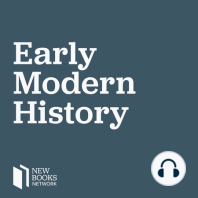67 min listen

Ayesha A. Irani, "The Muhammad Avatāra: Salvation History, Translation, and the Making of Bengali Islam" (Oxford UP, 2021)
Ayesha A. Irani, "The Muhammad Avatāra: Salvation History, Translation, and the Making of Bengali Islam" (Oxford UP, 2021)
ratings:
Length:
41 minutes
Released:
Apr 14, 2021
Format:
Podcast episode
Description
The Muhammad Avatāra: Salvation History, Translation, and the Making of Bengali Islam (Oxford University Press, 2021) reveals the powerful role of vernacular translation in the Islamization of Bengal.Its focus is on examines the magnificent seventeenth-century Nabīvaṃśa of SaiyadSultān, who lived in Arakanese-controlled Chittagong to affirm the power of vernacular translation in the Islamization of Bengal.
Drawing upon the Arabo-Persian Tales of the Prophets genre, the Nabīvaṃśa ("The Lineage of the Prophet") retells the life of the Prophet Muhammad for the first time to Bengalis in their mother-tongue. Saiyad Sultān lived in Arakanese-controlled Chittagong,in a period when Gauṛiya Vaiṣṇava missionary activity was at its zenith. This book delineates the challenges faced by the author in articulating the pre-eminence of Islam and its Arabian prophet in a place land where multiple religious affiliations were common, and when GauṛīyaVaiṣṇava missionary activity was at its zenith. Sultān played a pioneering role in setting into motion various lexical, literary, performative, theological, and, ultimately, ideological processes that led to the establishment of a distinctively Bengali Islam in East Bengal, while yet shaping a distinctively Bengali Islam. At the heart of this transformation of a people and their culture lay the persuasiveness of translation to refresh salvation history for a people on a new Islamic frontier. The Nabīvaṃśa not only kindled a veritable translation movement of Arabo-Persian Islamic literature into Bangla, but established the grammar of creative translation that was to become canonical for this regional tradition. This text-critical study lays bare the sophisticated strategies of translation used by a prominent early modern Muslim Bengali intellectual to invite others to his faith.
Raj Balkaran is a scholar, educator, consultant, and life coach. For information see rajbalkaran.com.
Learn more about your ad choices. Visit megaphone.fm/adchoices
Drawing upon the Arabo-Persian Tales of the Prophets genre, the Nabīvaṃśa ("The Lineage of the Prophet") retells the life of the Prophet Muhammad for the first time to Bengalis in their mother-tongue. Saiyad Sultān lived in Arakanese-controlled Chittagong,in a period when Gauṛiya Vaiṣṇava missionary activity was at its zenith. This book delineates the challenges faced by the author in articulating the pre-eminence of Islam and its Arabian prophet in a place land where multiple religious affiliations were common, and when GauṛīyaVaiṣṇava missionary activity was at its zenith. Sultān played a pioneering role in setting into motion various lexical, literary, performative, theological, and, ultimately, ideological processes that led to the establishment of a distinctively Bengali Islam in East Bengal, while yet shaping a distinctively Bengali Islam. At the heart of this transformation of a people and their culture lay the persuasiveness of translation to refresh salvation history for a people on a new Islamic frontier. The Nabīvaṃśa not only kindled a veritable translation movement of Arabo-Persian Islamic literature into Bangla, but established the grammar of creative translation that was to become canonical for this regional tradition. This text-critical study lays bare the sophisticated strategies of translation used by a prominent early modern Muslim Bengali intellectual to invite others to his faith.
Raj Balkaran is a scholar, educator, consultant, and life coach. For information see rajbalkaran.com.
Learn more about your ad choices. Visit megaphone.fm/adchoices
Released:
Apr 14, 2021
Format:
Podcast episode
Titles in the series (100)
Daniela Bleichmar, “Visible Empire: Botanical Expeditions and Visual Culture in the Hispanic Enlightenment” (University of Chicago Press, 2012): Daniela Bleichmar‘s new book is a story about 12,000 images. In Visible Empire: Botanical Expeditions and Visual Culture in the Hispanic Enlightenment (University of Chicago Press, 2012), Bleichmar uses this vast (and gorgeous) archive of botanical ima... by New Books in Early Modern History